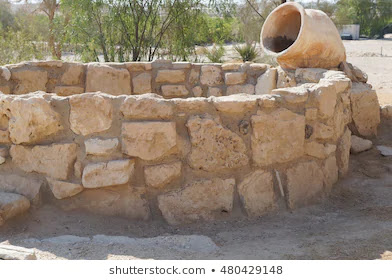At the well
Our church's sermon today (which we enjoyed, as usual, from the comfort of our couch) was about one of my favorite stories in the Bible: the story of the woman at the well. I've always been fascinated by Jesus, who is in the wrong place at the wrong time for all the right reasons. I resonate with the woman who's made so many mistakes, she lives all of her life in the consequent roundabouts of avoidance and isolation.
As I listened today, I was reminded that it's not the only story set at the side of a well. In fact, it's one of several.
Hmmm, I thought to myself. And I got on with my day.
But something was nagging at me. Something about this specific setting, about the well itself. There are beautiful parallels in the story of the woman at the well between the water she gathered daily (at a time when no one else is near) and the water that Jesus offered. The contrast was intentional, to highlight the futility of her life and the extravagant, reckless generosity of his grace. The well played a part in the story itself. Had it in other stories as well?
There was the story of Hagar, having borne an illegitimate son to Abraham, on the run from his jealous wife. Fleeing into the desert alone and afraid, her son was crying and dying. An angel appeared to her, comforted her, and told her to return to her mistress--God had plans for her son as well as Sarah's. An encounter with God at a well.
It was by a well that Abraham's servant, sent to find a wife for his son Isaac, prayed that God would provide the right woman. He laid out a specific request: that the woman God sent would offer water not only to him, but to his camels. Within moments Rachel appeared, generously offering to draw up water for him and all of his animals. An answer from God at a well.
Moses, raised as an Egyptian prince, had killed a slave driver and fled into the desert. Lost and alone and running for his life, he sat to rest by a well. A group of sisters arrived and were threatened by local shepherds. Moses came to their rescue, and eventually became part of their beautiful family. It was this family that taught him about a God he'd only known from a distance, a God who would later call him to return to Egypt to free his people. The gift of family, given at a well.
A lame man sat by the side of a well that was said to have healing powers. Each day, as the waters were stirred, the sick rushed to be the first to wade into the water and find healing. Unable to walk, he sat day after day, year after year, unhealed. Then Jesus arrived with the words, "Do you wish to be well?" and the gift of new, whole life. Healing from God at a well.
These are only a few of the beautiful, life-changing moments that happened at the edge of a well. The stories are woven like beautiful dots on a road map all throughout the story of the Bible. And I find myself asking, Why? Why are all these stories connected to wells?
In ancient times, of course, there was no running water. Wells were an absolute requirement for life. If there was to be water for food, for cleaning, for growing crops, it would be tied inextricably to the presence of a well. They were places that were visited often--sometimes twice a day. They were a part of the daily chores that must be completed, a mundane and everyday necessity. In other words, they were ordinary.
And yet, the ordinary became sacred. Each encounter--each moment in the mundane necessary place--became a life-changing intersection of the humble and the holy.
God used the wells to draw near and breathe life. Sure, he used the sacred places too--the synagogues and temples and Mount Sinais. But encounters with him were not restricted to these special places. More often than not, actually, they happened in the mundane everyday spaces in which lives were lived.
It's a truth that resonates deeply with me in this season when we are most often kept from the sacred and holy places. From the churches, the gatherings of friends, the community that bolstered us in the past. When we're left to live out our faith in front of kitchen sinks and piles of laundry and days that stretch out endlessly in isolation. The rooms that are filled with the tears of lonely children, of disrupted incomes, and of roundabouts and work-arounds meant to keep us safe. They're difficult, mundane, ordinary places. And they feel far, sometimes, from the reach of God.
But if the wells of the Bible have taught me anything, it's that no humble place is beyond redemption. No ordinary moment is too ordinary to escape the possibility of his presence. No well is ever wasted.
As we find ourselves sitting next to the wells of this season--sometimes crying, sometimes fighting, sometimes lonely, sometimes unwell--I pray we find what those before us have found: that God is as present at the wells as he is in the temple courts. I pray we have our own life-changing moments right here. I pray that, when we are finally able to gather again in the sacred spaces, it's with hearts full of our own well-side stories and the beauty of God's grace that doesn't wait for the pristine moments to reveal itself. He will meet us, even here at the well.

